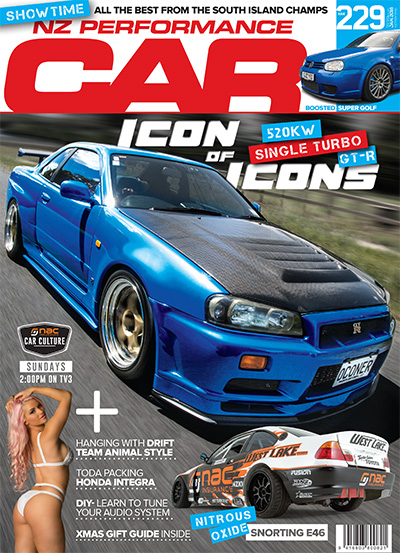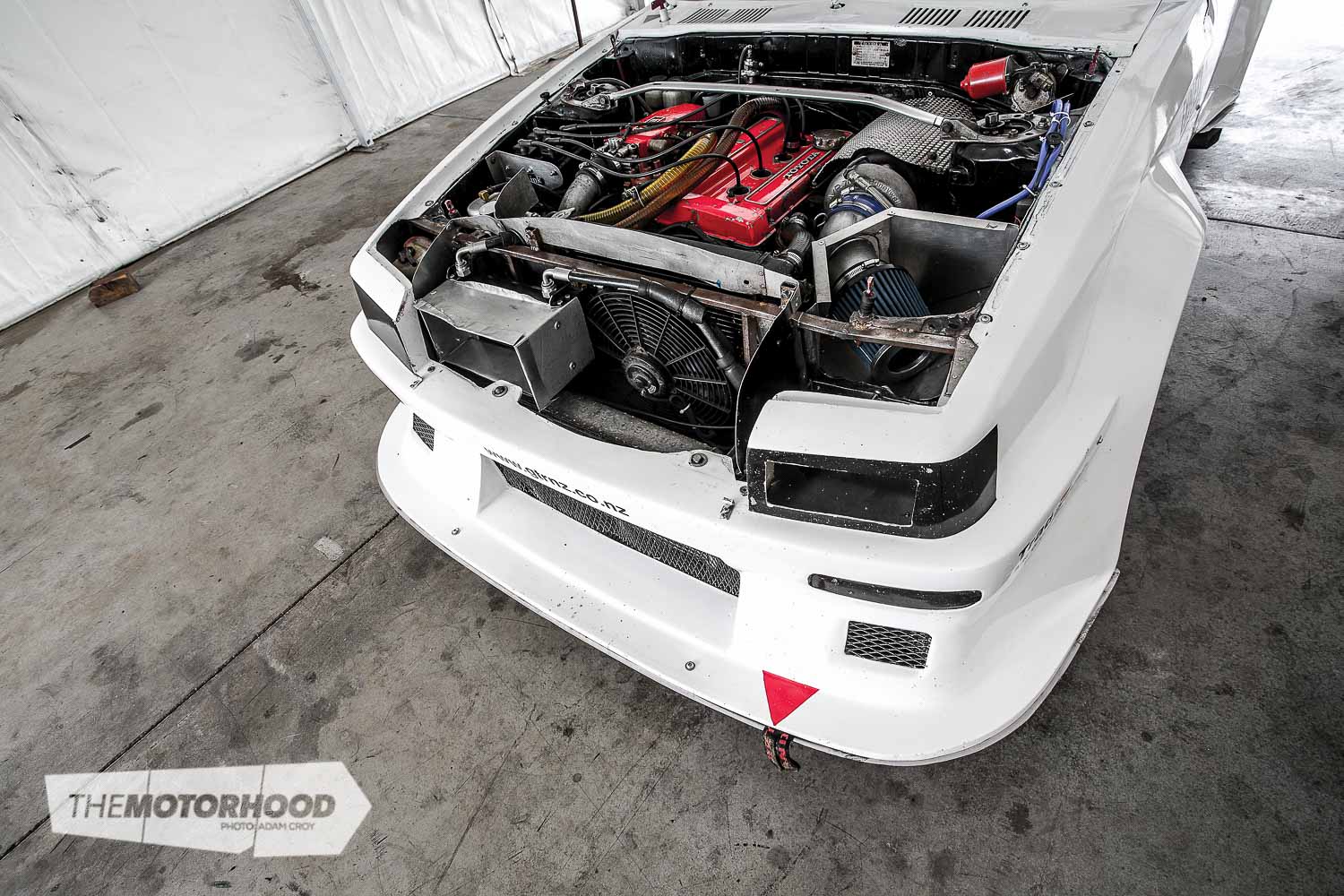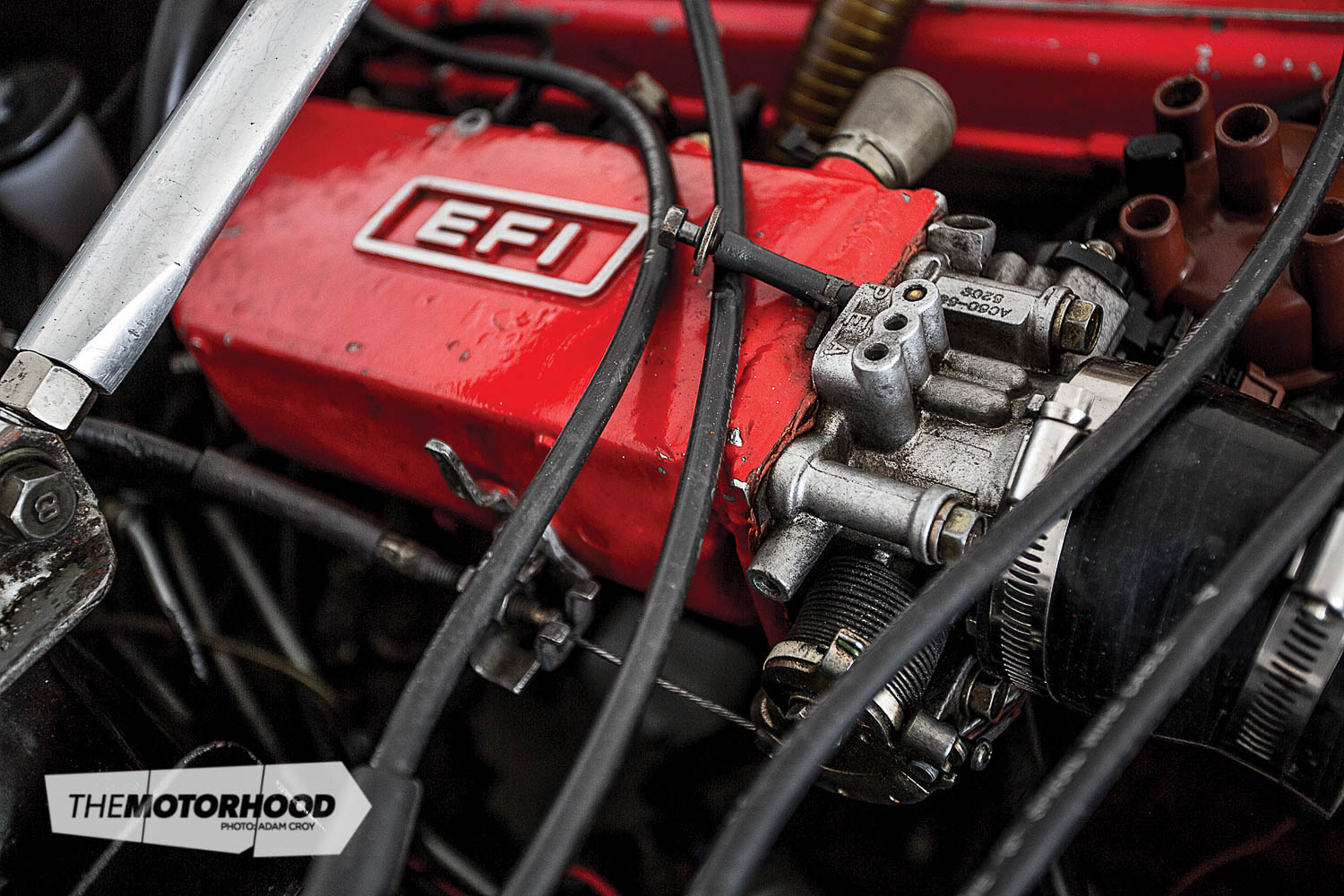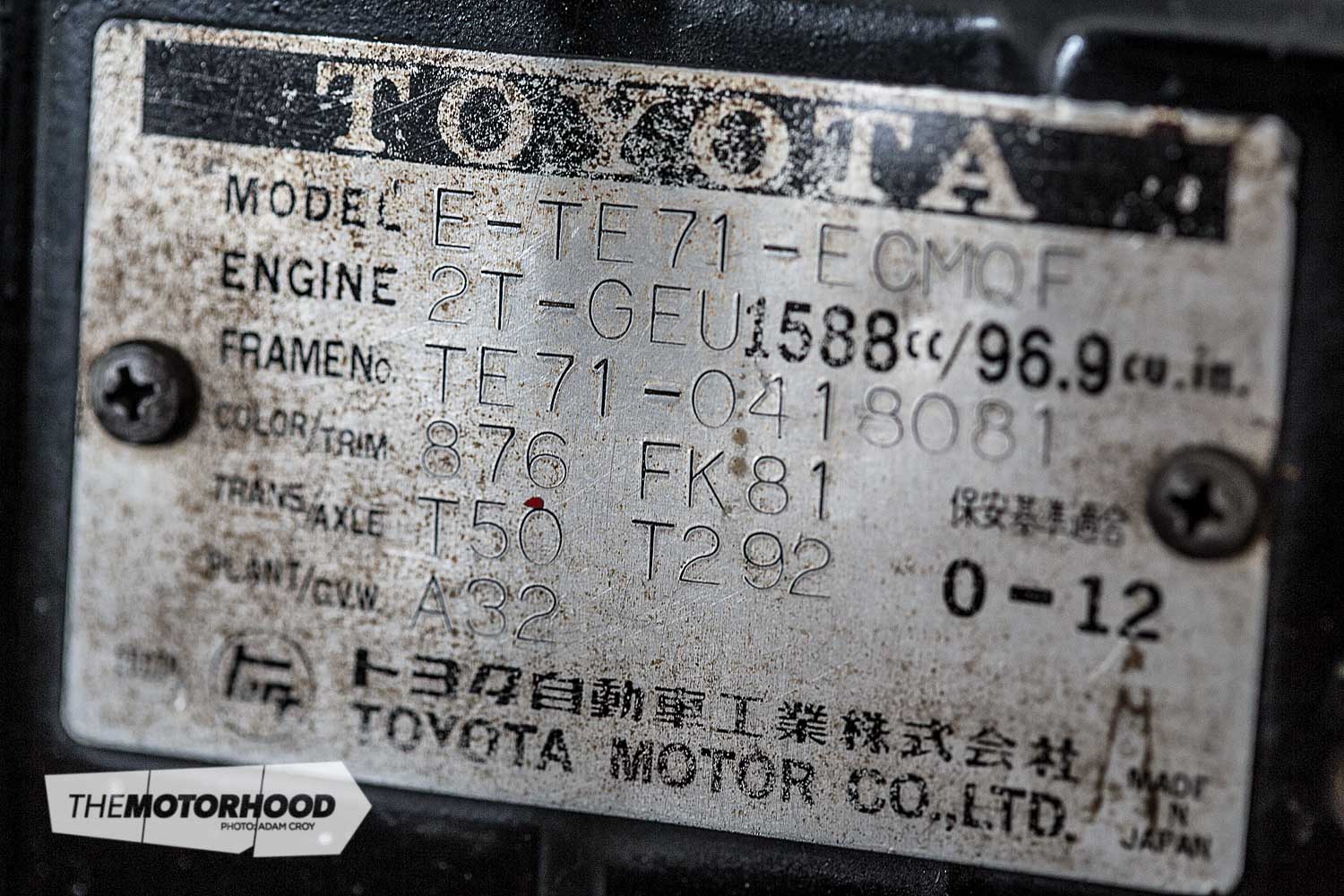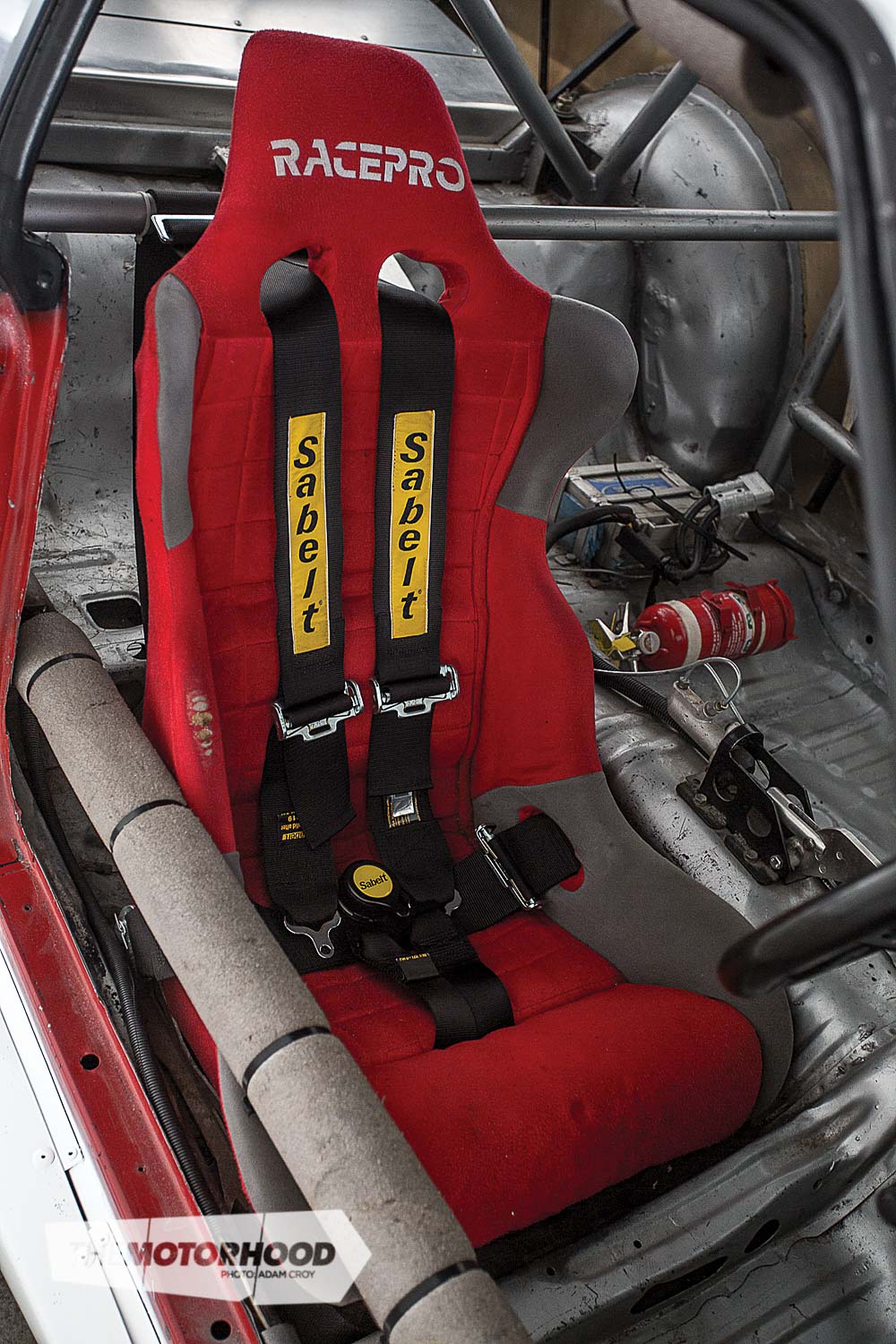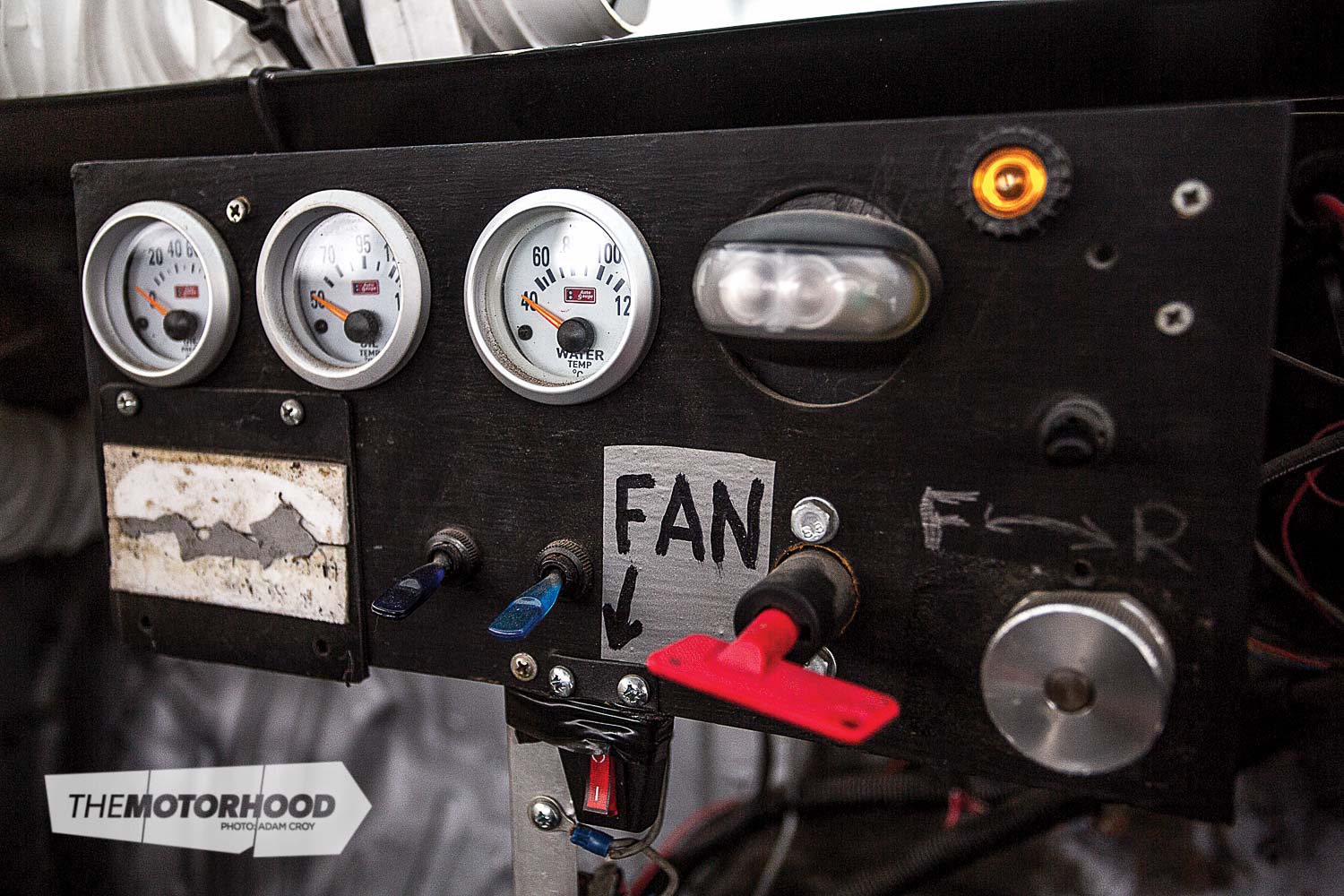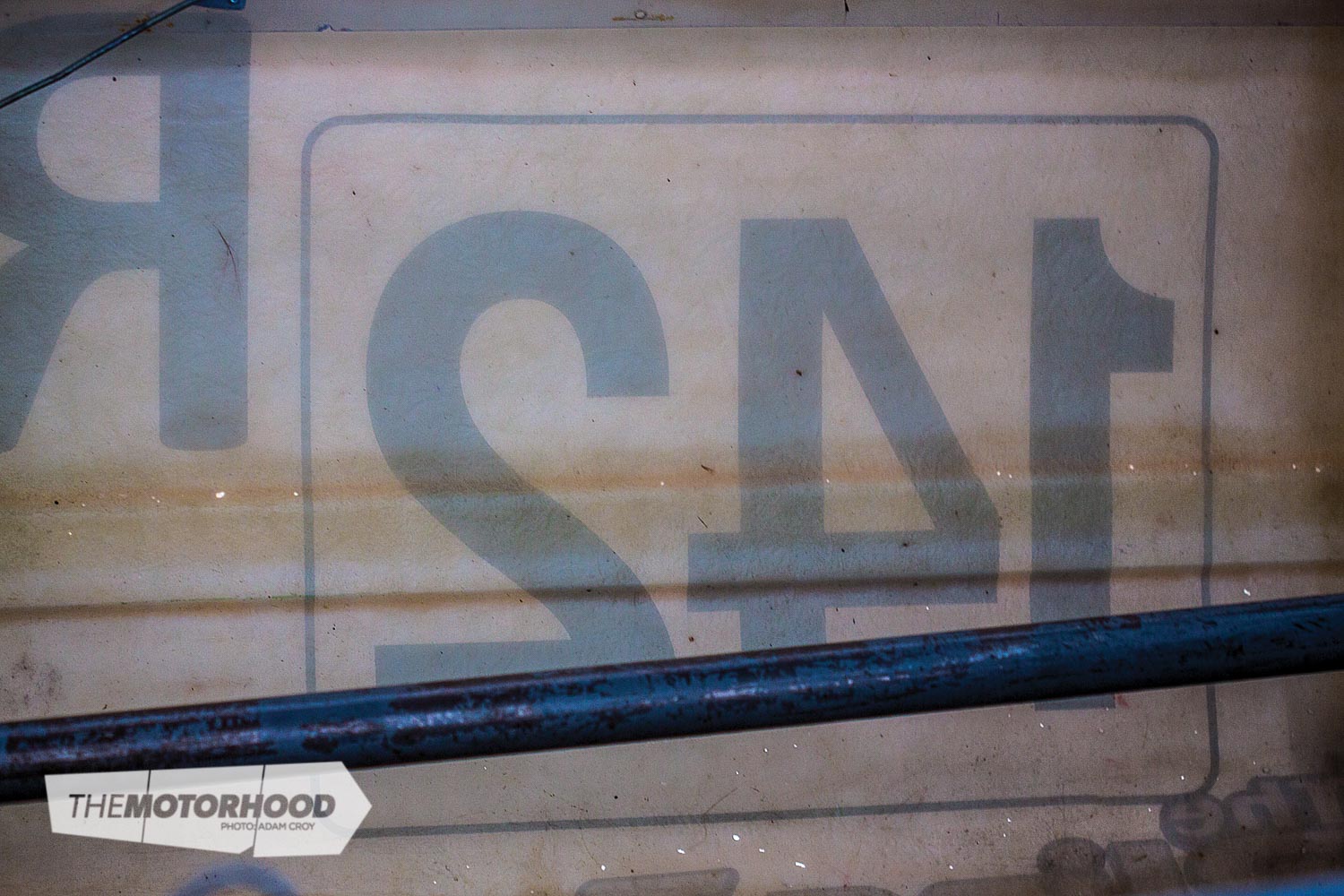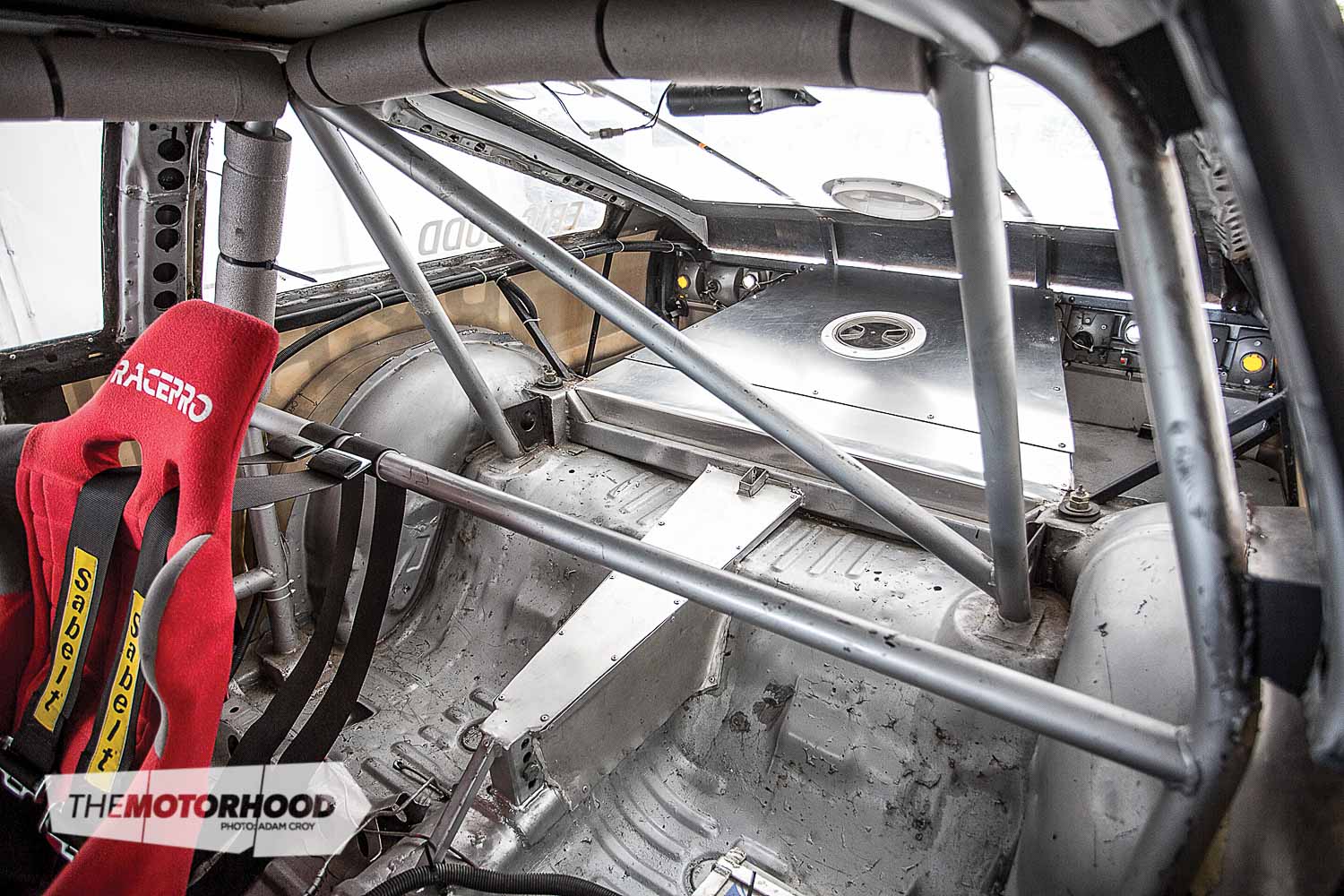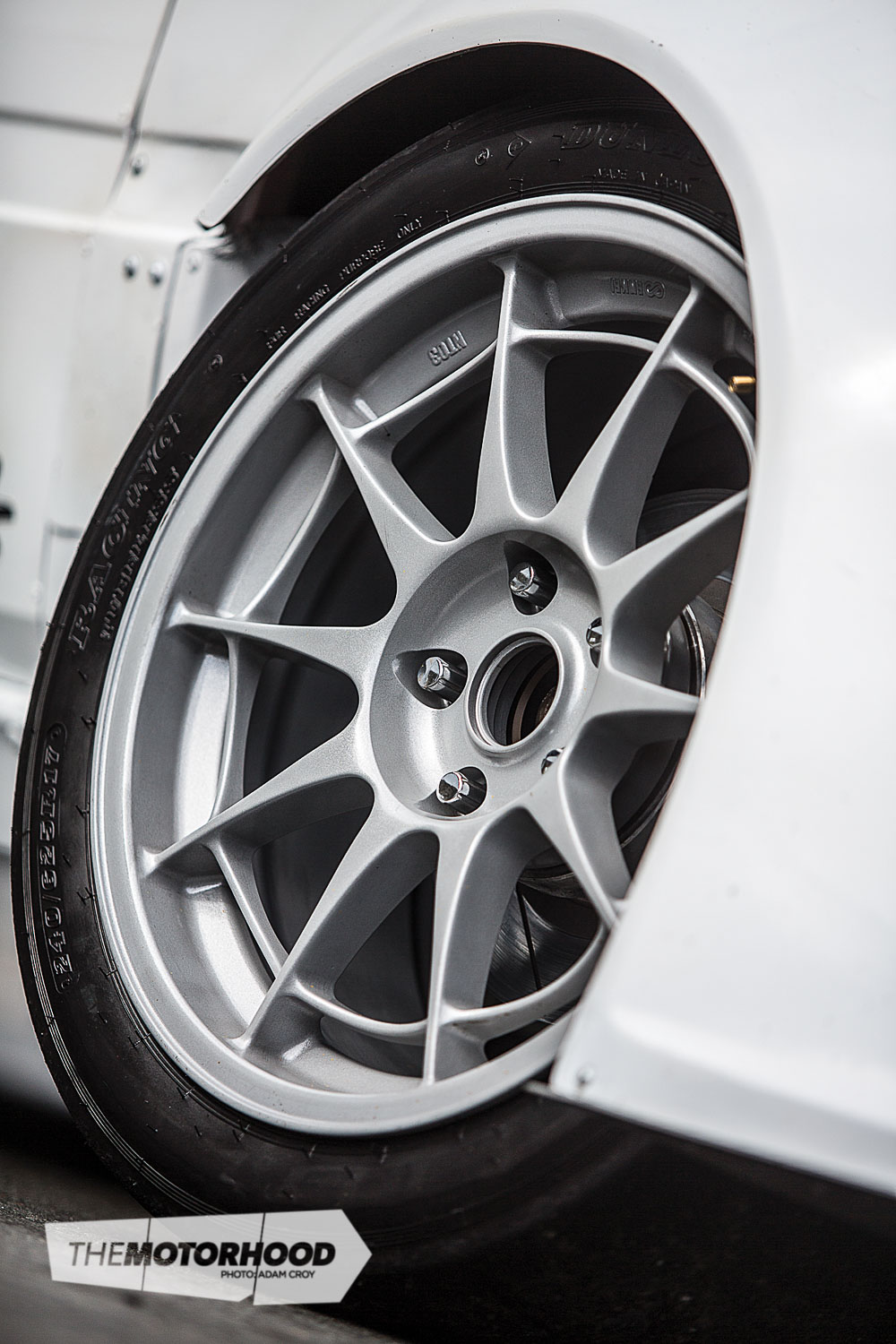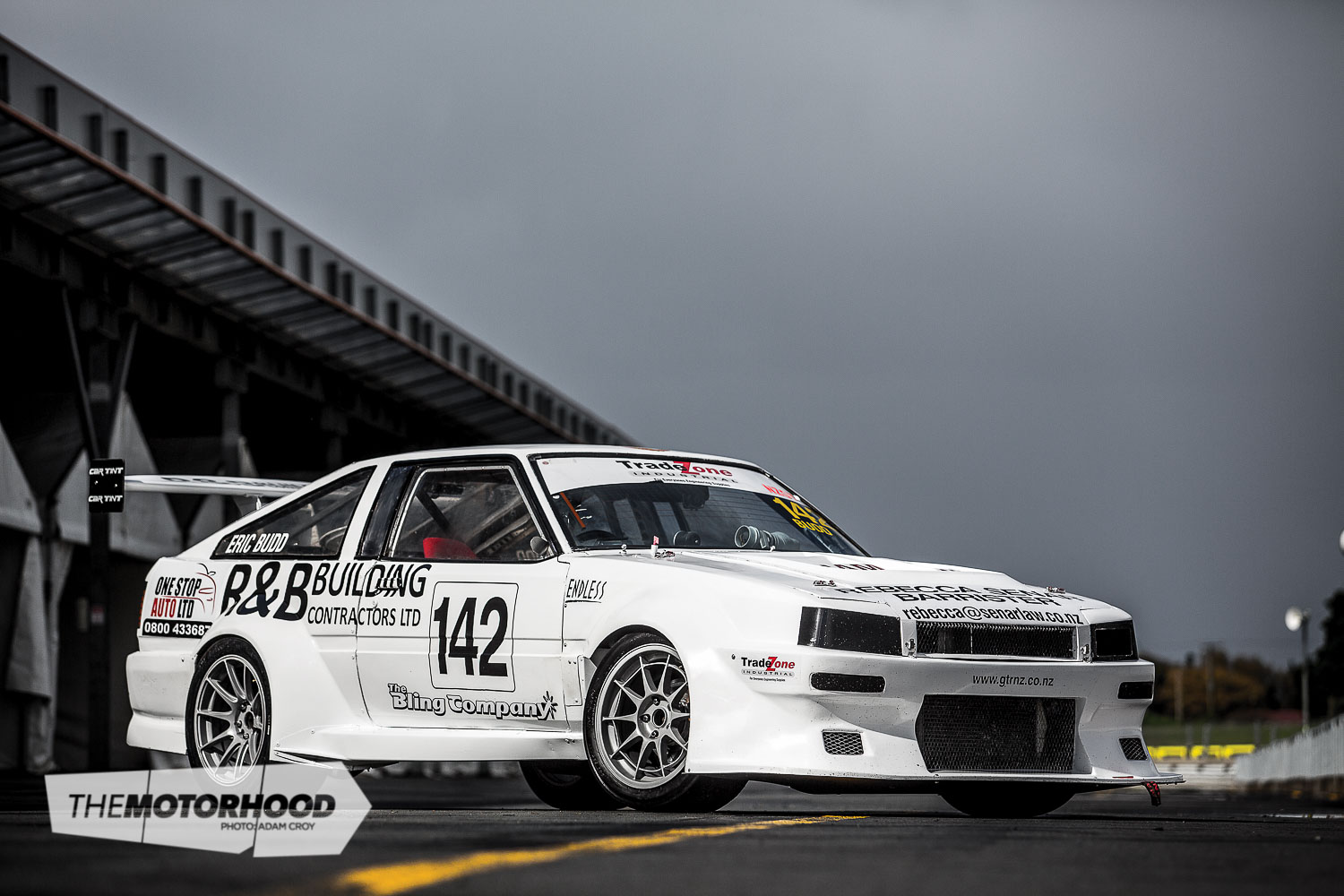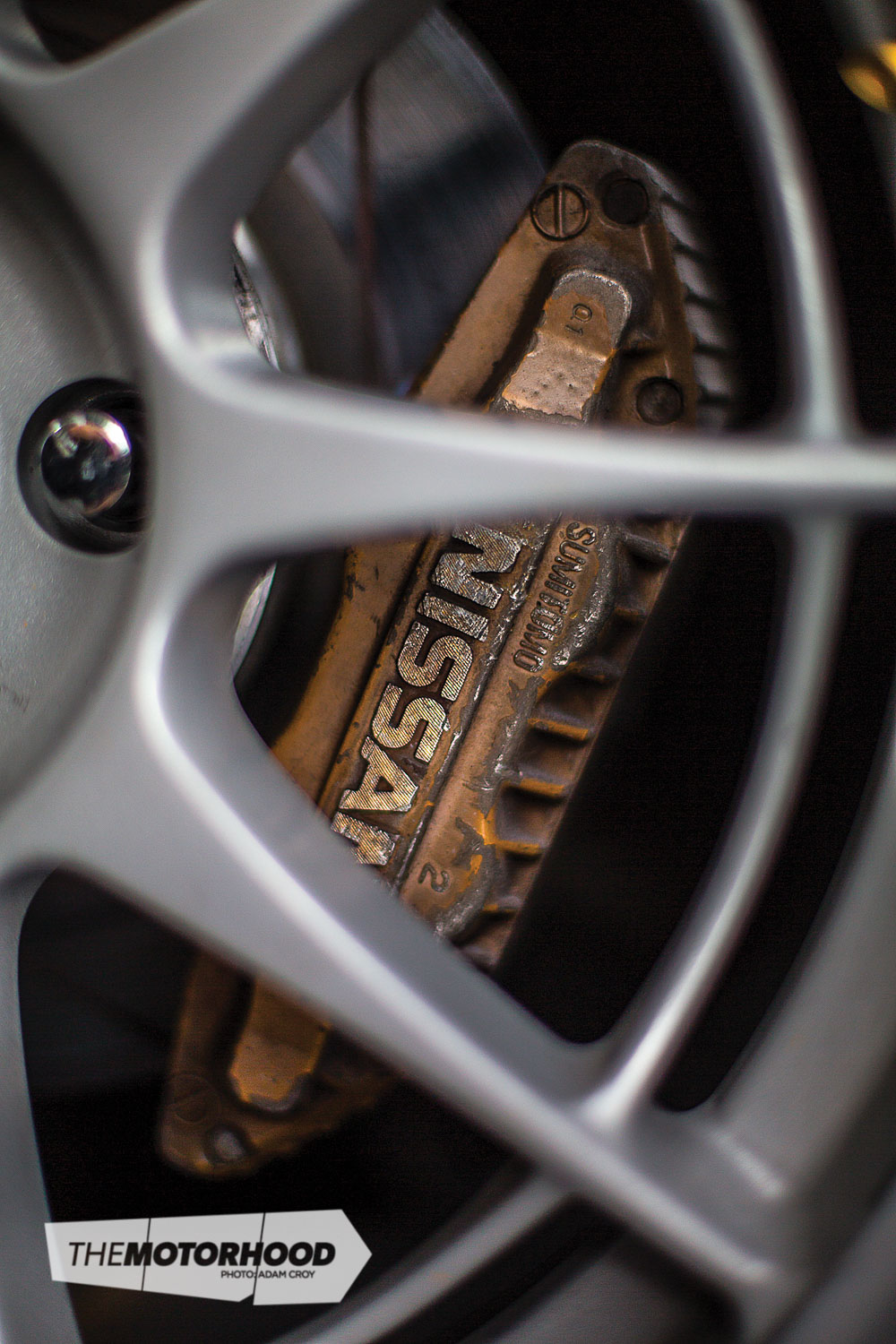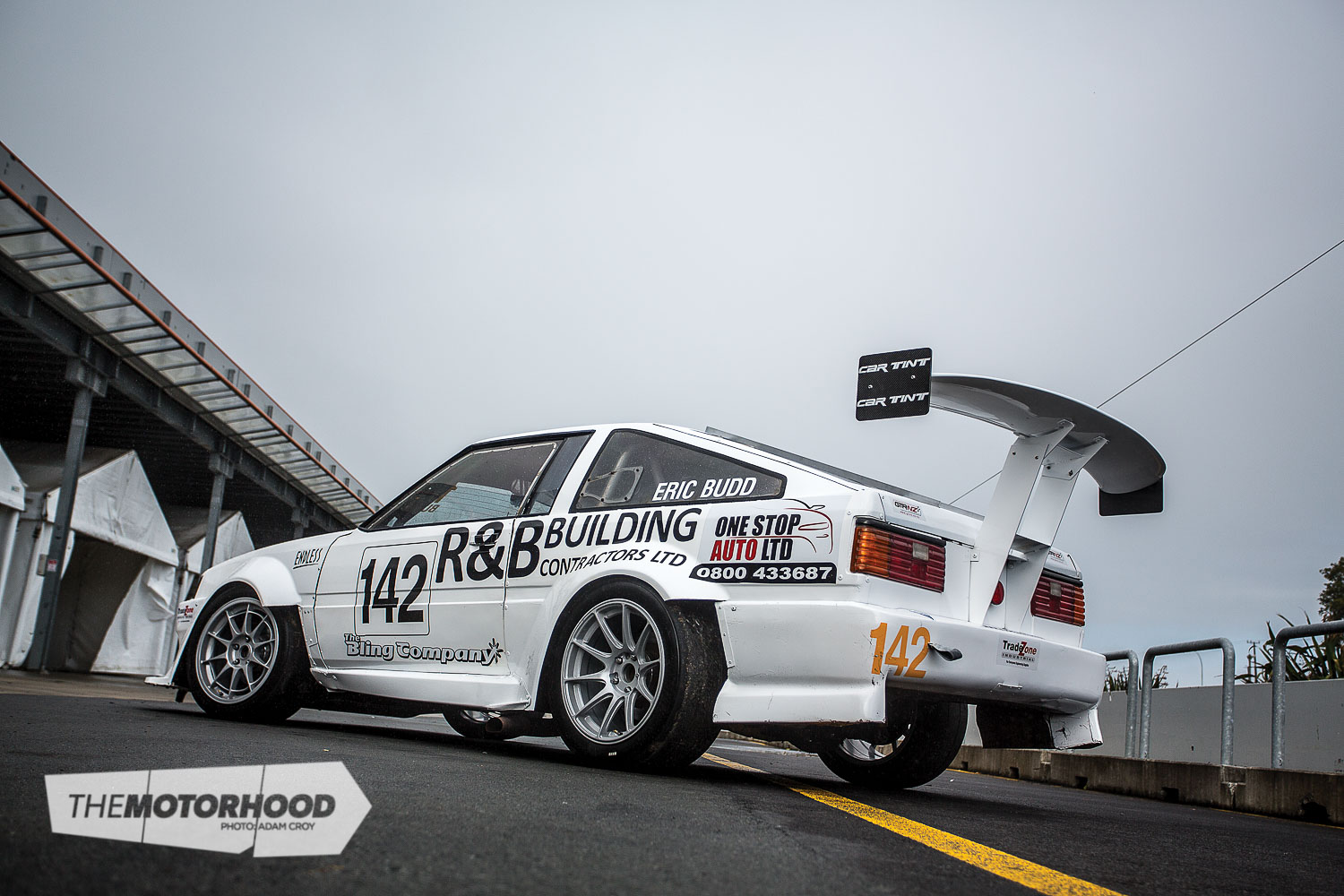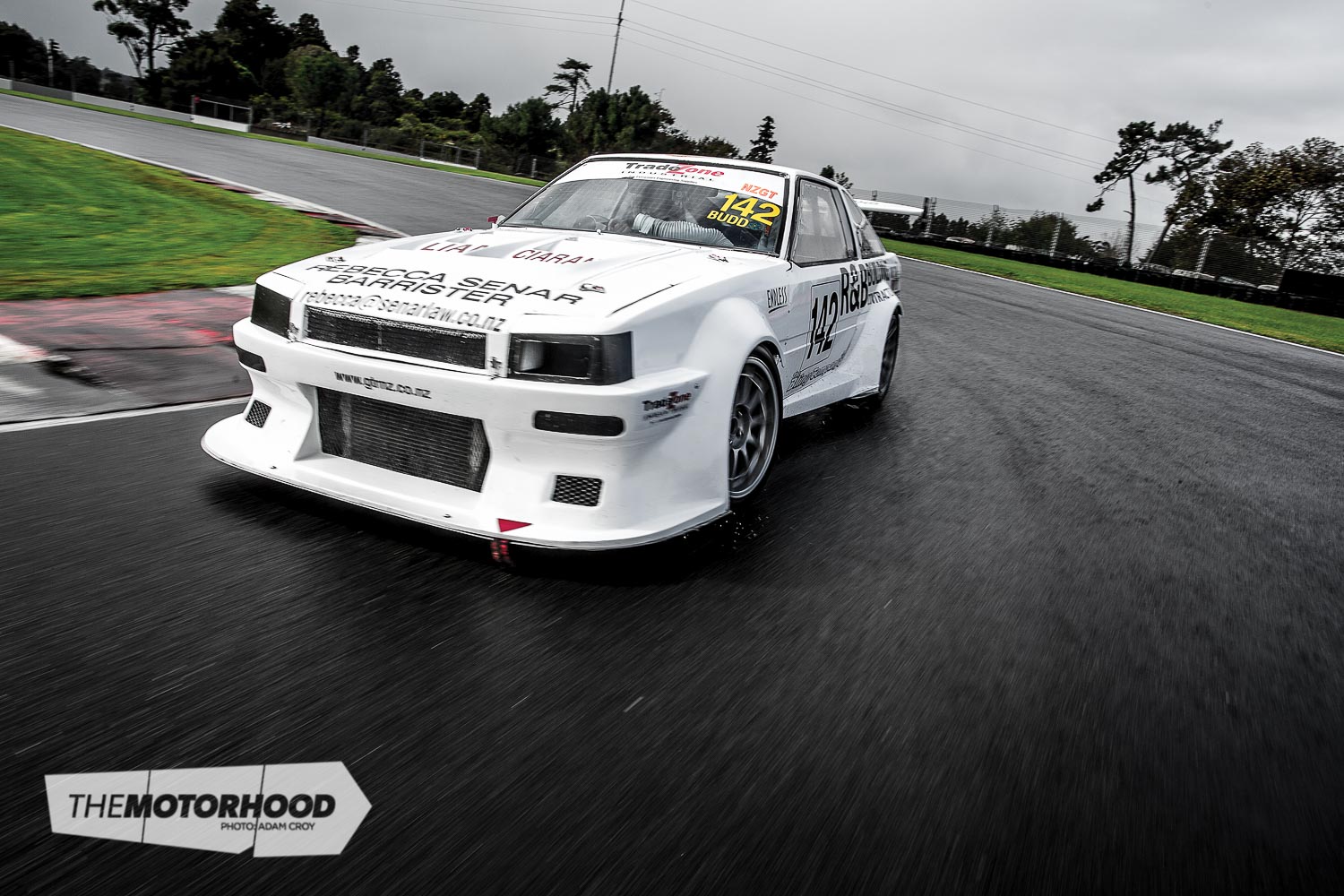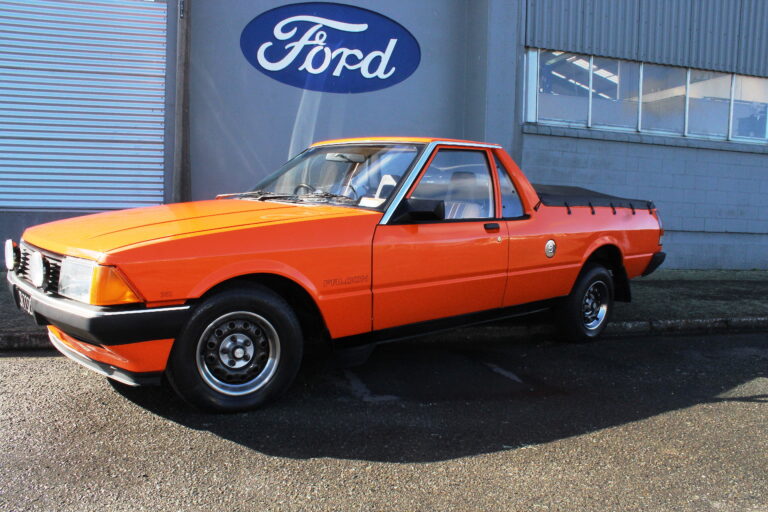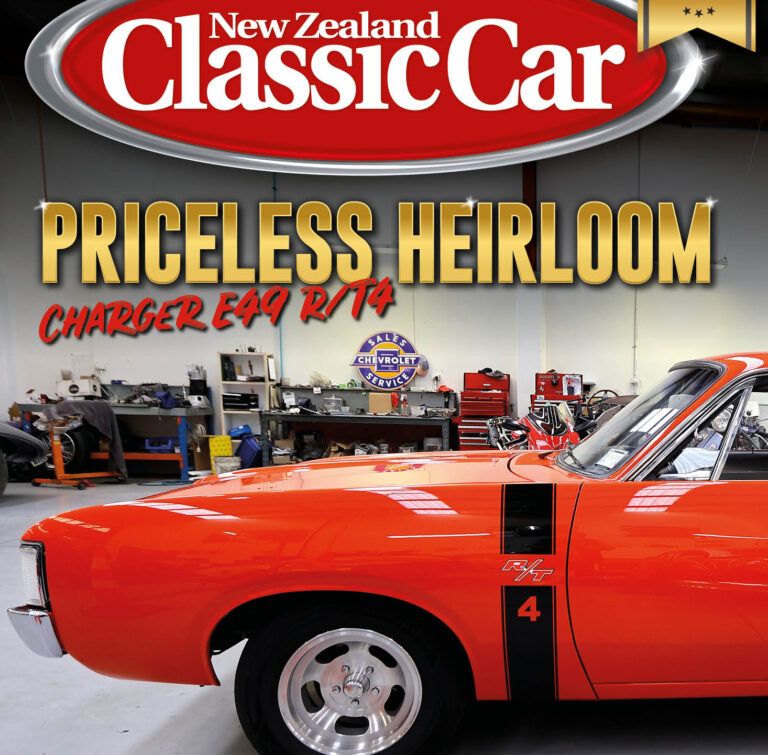data-animation-override>
“Eric Budd proved it doesn’t take huge power, piles of cash or the latest technology to kick ass at NZGT — one of New Zealand’s most intense race classes. He did it with his 1980 Corolla Levin TE71”
Eric Budd has owned his 1980 Toyota Corolla since 2004, but you’d be right in thinking this white, ’80s Corolla doesn’t really look like it did when it left the Japanese factory — in fact we struggled to identify it here at the NZ Performance Car office. We’d called it in because we’d heard the stories — NZGT was being dominated by a white Toyota Corolla that had been built in a rural Hamilton shed over the course of 10 years — and we had to know more.
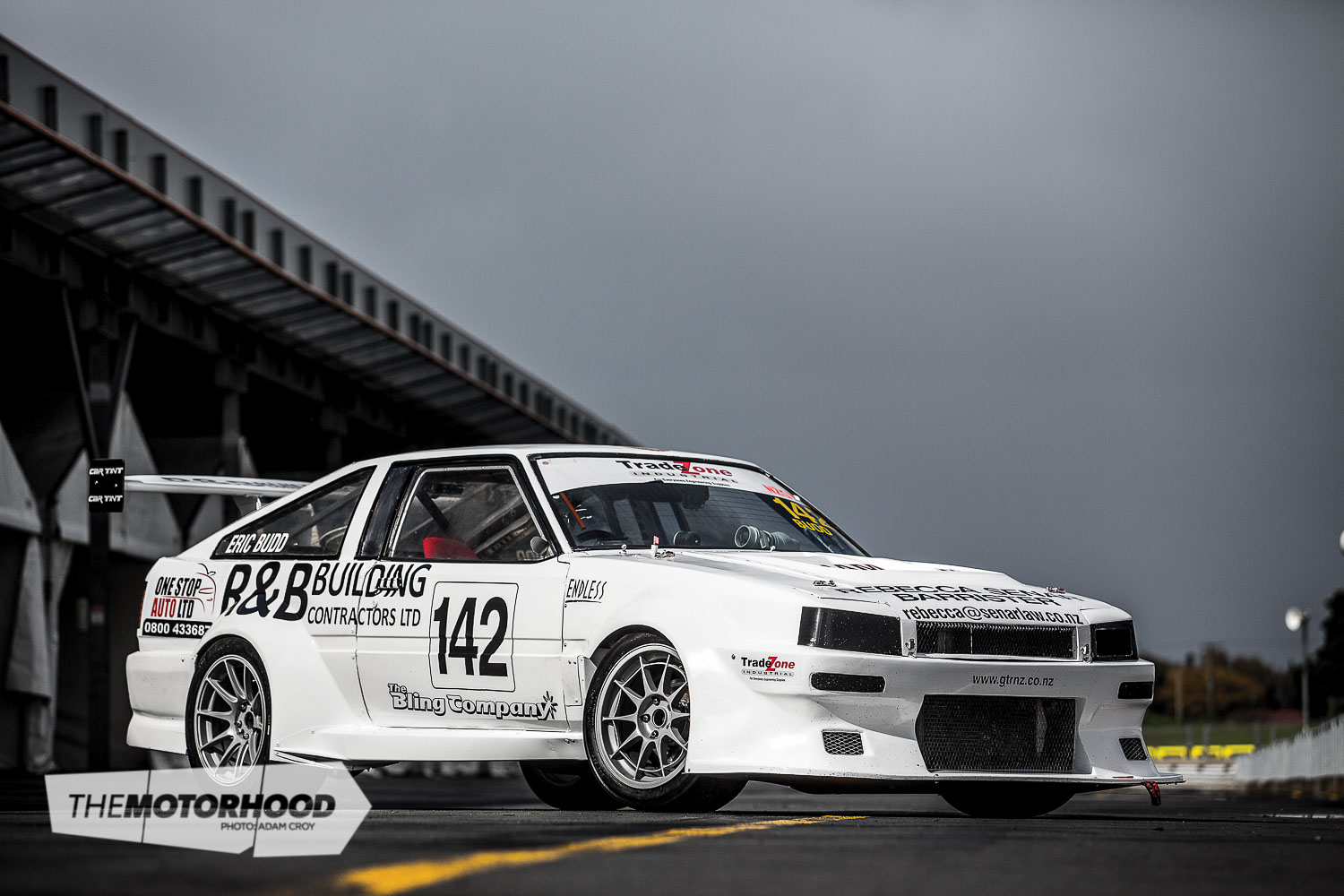
It all began back in 2004, when Eric purchased this car complete, and running a 3T-GTE engine conversion. The 3T-GTE was Toyota’s first twin-cam turbocharged motor: it featured twin sparkplugs per cylinder, two cams with eight valves, and a single CT20 turbocharger. Although it was no powerhouse, it did produce an impressive (for the time) 119kW (160hp). Best of all though, it had potential, thanks to the turbocharger hanging off the side. Eric’s 3T-GTE had been “rudely” installed, as he put it, but nonetheless, it was in there. However, only a short time after he’d bought it the engine exploded in a glorious fashion, and so the 10-year project began.

With the engine in for its first rebuild, Eric decided to install an intercooler to help reduce the chance of detonation in future, as it was this which had caused the motor’s untimely demise. At the same time, he thought he may as well make a spoiler to house it in … then, as they tend to, things soon spiralled out of control. “Two years later, it was still in the shed having custom fibreglass panels made for it,” Eric told us. It was in this guise he first entered SS2000, the stepping stone for his New Zealand–based weekend-warrior racing career. After three years of contesting SS2000, he made the move into GTRNZ, finding his home within NZGT. By this point the tough little 3T-GTE was producing good power, with a 2T-GEU naturally-aspirated head adding a bump in compression, plus a Sinco top-mounted manifold, and a Garrett T3/T4 turbo cooled by a factory Mitsubishi Evo intercooler. At the end of the 2011–2012 season Eric was invited to take part in the famous ITM Hamilton 400 in the GT1 support class, which was when he met Dave Heedergen from Dtech Motorsport. “We spoke about ECUs, turbos and coils. Dave convinced me to rip the old Link G1 ECU out and replace it with a Link G4 Storm, and switch to individual coil packs. This started my ongoing relationship with Dtech, and sparked further development of the Corolla.”
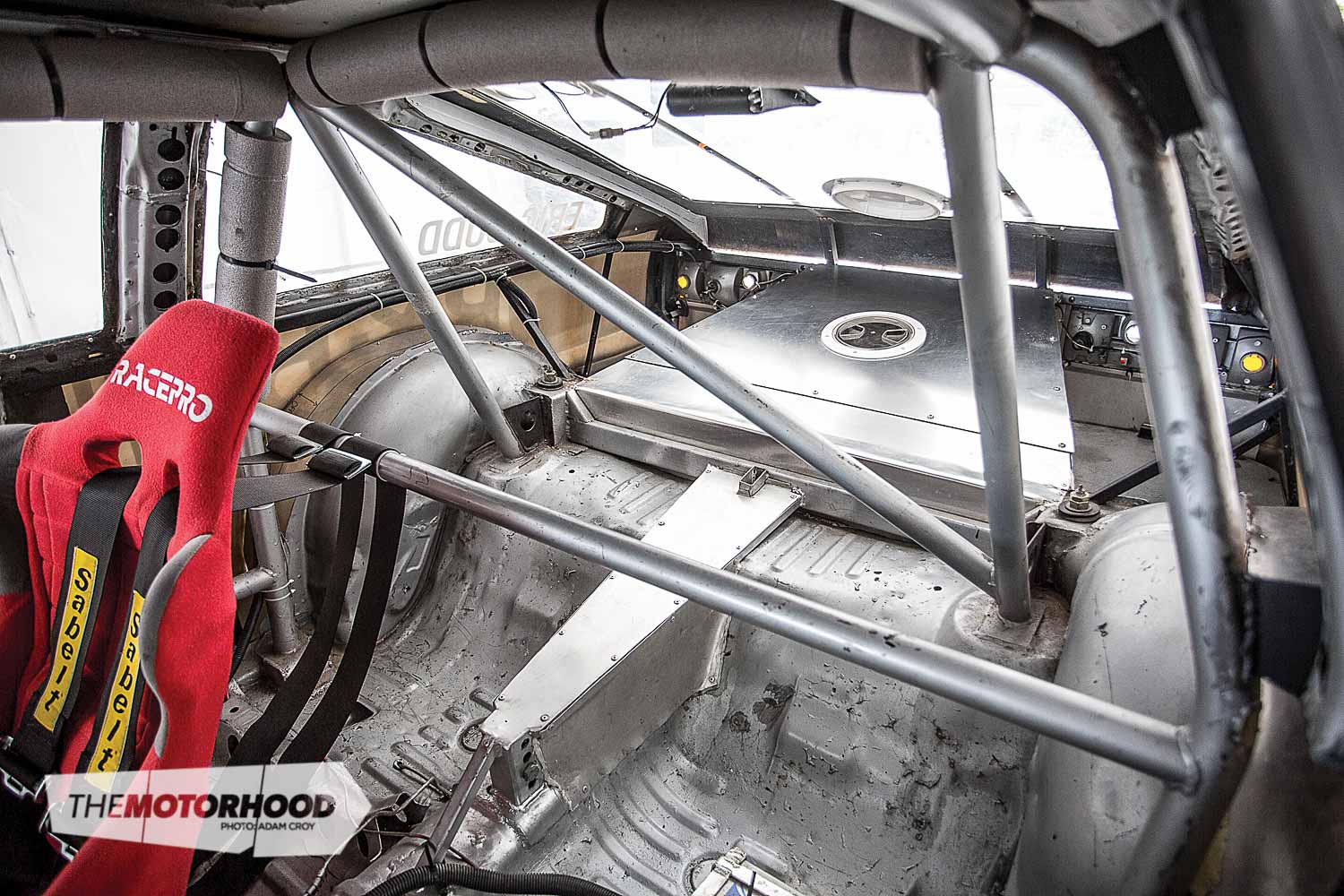
Although the engine was now pushing out more power, Eric had a few gremlins to work through soon after the new set-up had been developed during the 2012–2013 season, including a blown head gasket and misfiring issues. Getting T-boned at Manfeild Autocourse didn’t help either, however, Mark at Puketaha Workshop had the Corolla panelled and painted before the next meeting. The rear suspension was completely redesigned at this point too, and now features a custom three-link set-up with a Toyota Hilux diff, complete with a custom two-way LSD unit.
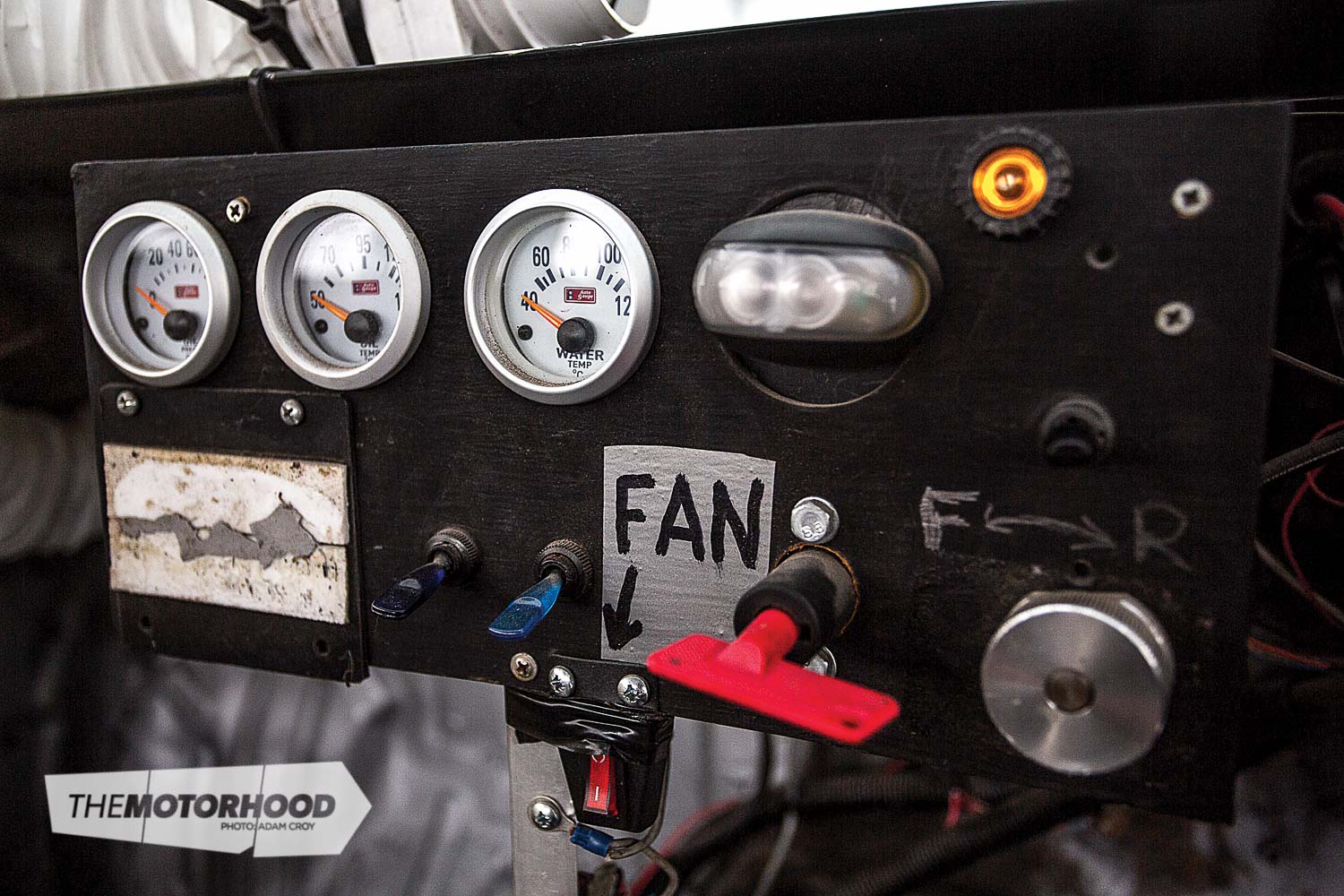
Sadly the 2013–’14 season ended abruptly when a rod punched a hole in the block. There are a few theories why that happened: Eric thinks the cause was a weeping head gasket. The rebuild during the off season saw a replacement engine built up, and the car received plenty of body work. A Link boost controller was added to bring boost in sooner, but the bulk of the off-season work went into completing a full wide-body kit, as well as changing the colour from its well-known red to a crisp white.
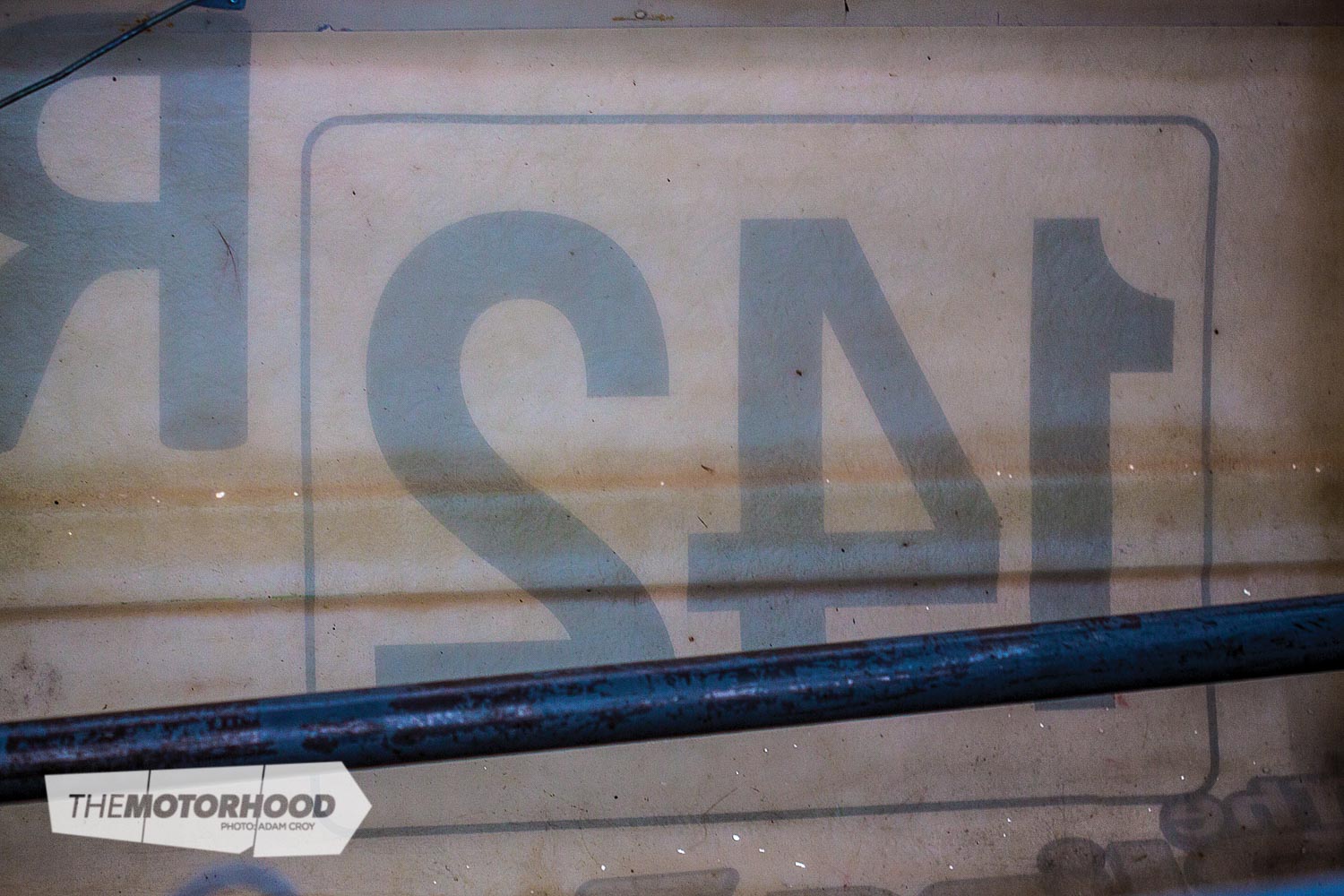
Every panel on the Corolla is now fibreglass, including the one-piece front end, the sides, the thin two-layer doors, and even the hatch. This bodykit not only allows Eric to run a much wider slick, but also means the Corolla weighs in at around 930kg, with about 20 litres of high-octane aviation-grade fuel.
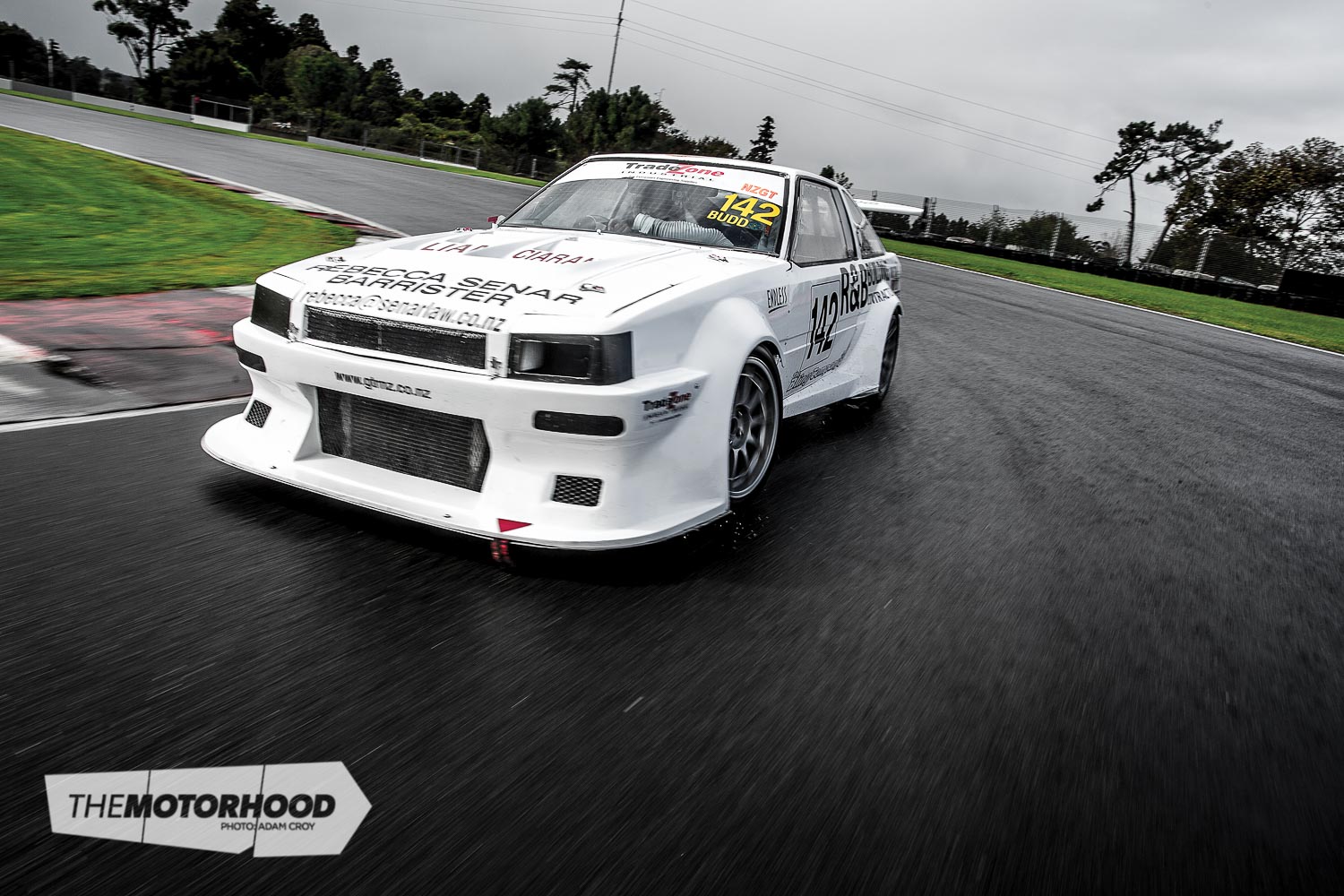
It is safe to say that Eric’s Corolla had become a monster. It was producing 247kW (331hp) and had the reliability to match, thanks to a set of forged pistons and rods. It was lighter than ever, had more aero than ever before, and more tyre. This would be Eric’s golden season.
The combo debuted at the first round of the season, and sadly in race two things didn’t quite go to plan. The first race saw an intercooler hose pop off, which placed Eric last, but thankfully he took back some glory with a fourth-place finish for the weekend. By round three, Eric was leading the series, and continued by dominating the remainder of the season. After the second race of the final round Eric knew he had it in the bag, and he walked home with a third-place finish from a reverse grid.
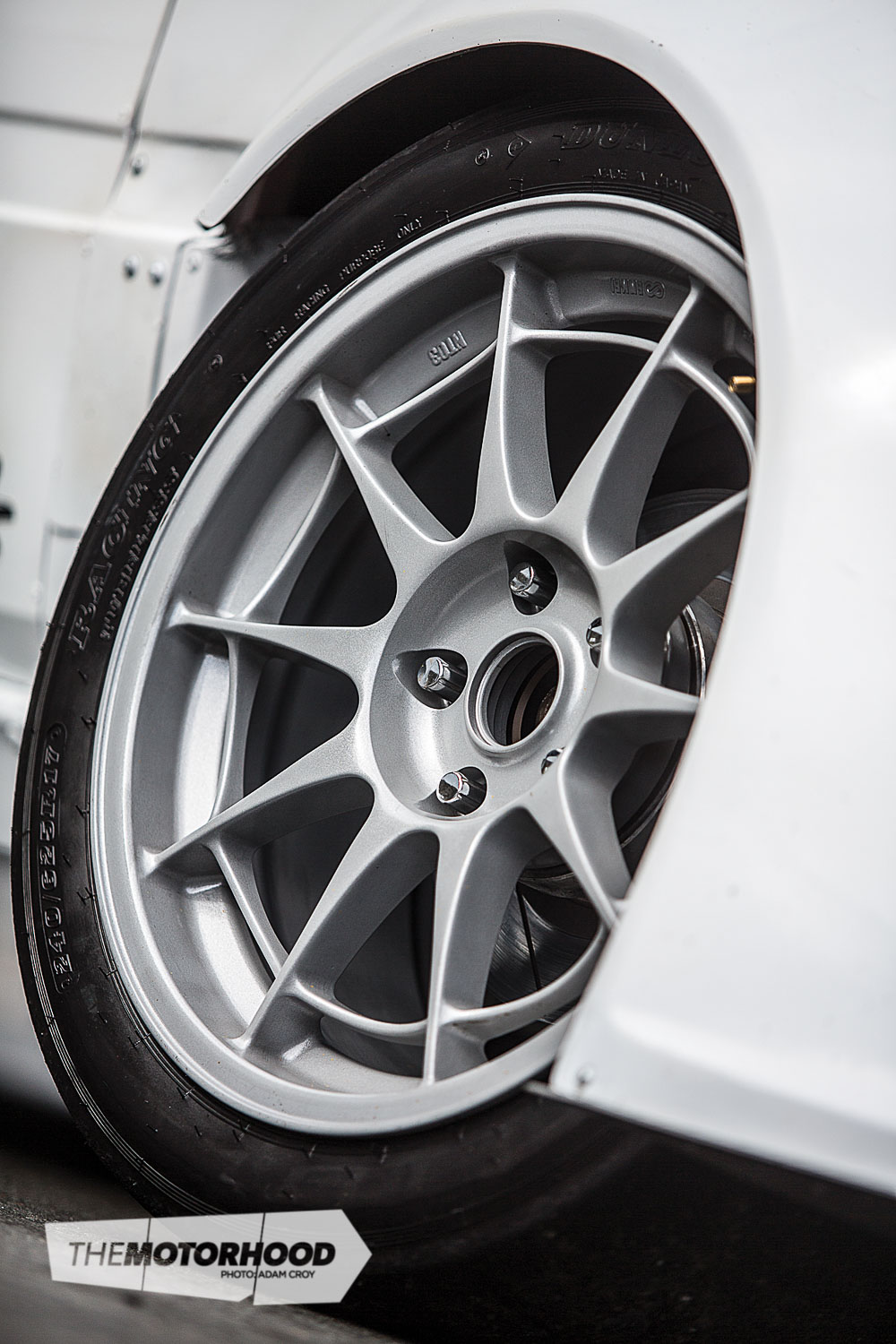
From street car to NZGT-series winner — this Corolla has seen it all. Eric plans to run the chassis for as long it’ll give him, which will no doubt be a good few more seasons. Originally he’d planned to swap the older-generation 3T-GTE engine for either a 3S-GTE or a turbocharged 4A-GE, but he’s gone off the idea for now, as the almost-vintage 3T has proven its durability time and time again.
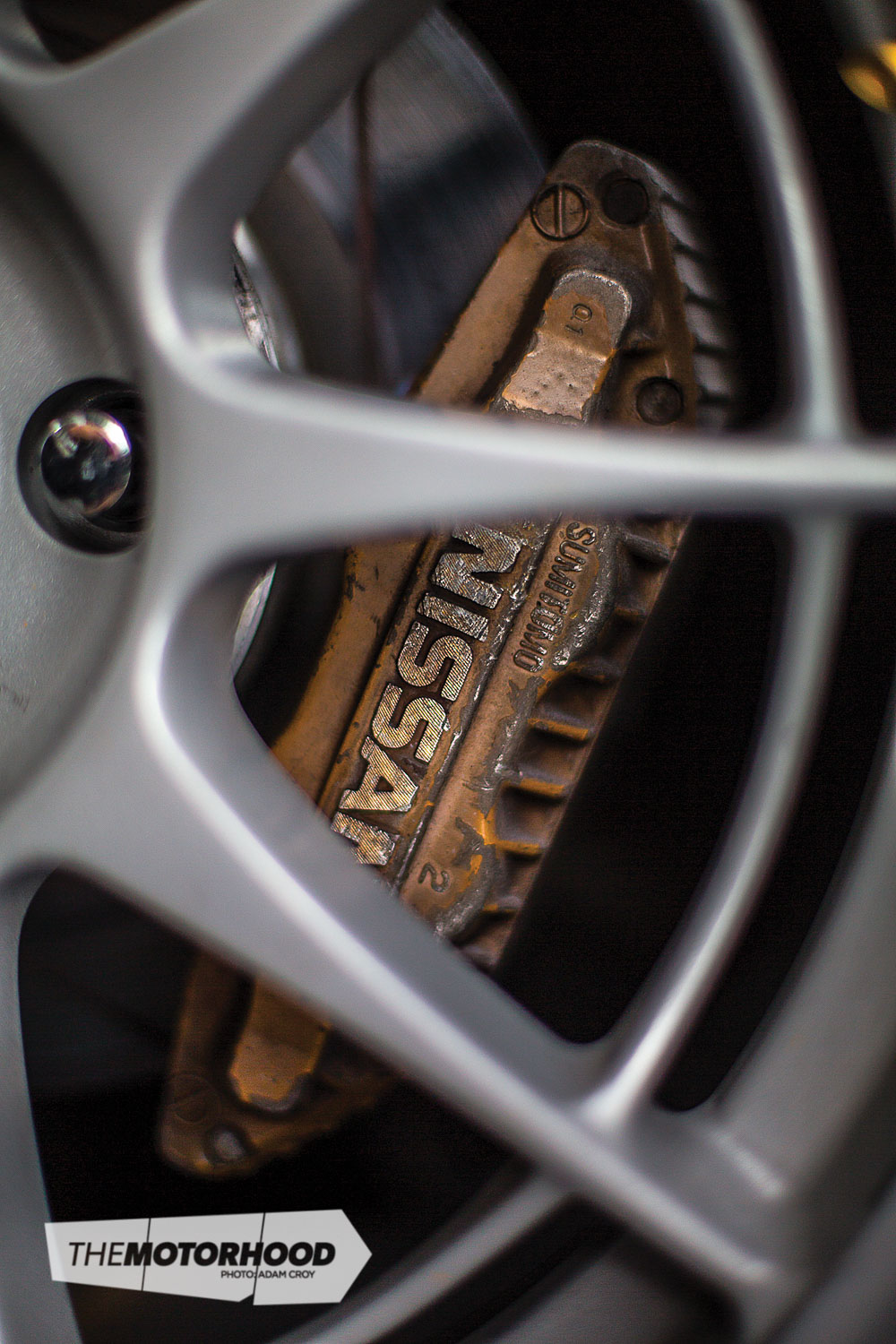
Those of you who think a big budget, an expensive chassis, and a late-model high-power motor are required to win a race series, think again. Get out in that shed and make a start — all it takes is the drive and the determination to succeed.
1980 Toyota Corolla Levin (TE71)
Heart
- Model: 3T-GTE, 1800cc, four-cylinder
- Block: Decked, countersunk head-stud threads, bored to 87mm with 8.5:1 Arias forged pistons, Eagle H-beam rods, fully balanced factory 3T-GTEU crankshaft
- Head: 2T-GEU, modified Mitsubishi Starion head-stud kit, reground cams by Franklin Cam Services, custom adjustable sprockets, extended valve-stems
- Intake: Custom cold-air box, four-inch pod filter, four-inch intake pipe, Evo III throttle body
- Turbo: Garrett T3/T4 turbo, Sinco turbo manifold, custom heat shield
- Wastegate: 38mm TiAL external
- BOV: Racepro
- Fuel: 40-litre alloy fuel tank, Carter lift pump, 2.0-litre surge tank, Bosch 044 fuel pump, factory fuel rail, 800cc injectors, D1 Spec fuel-pressure regulator
- Ignition: Mercury marine-grade individual coil packs, 8mm leads, NGK-R plugs
- Exhaust: Three-inch straight pipe, flexi-joint
- Cooling: Custom three-core twin-pass radiator, 19-row oil cooler
- ECU: Link G4 Storm
- Other: 2.0-litre catch can
Driveline
- Gearbox: W55 Supra five-speed gearbox, heavy-duty front bearing
- Clutch: Xtreme six-puck clutch plate, Xtreme heavy-duty pressure plate
- Flywheel: Lightened
- Diff: Hiace Super Custom diff housing, 4.88:1 LSD head, two-way LSD unit made by Rae Emerson Motorsport
- Other: Factory driveshafts, modified rear end to suit Hilux diff
Support
- Struts: TA63 Celica struts with adjustable bottom arms, camber plates, strut brace, adjustable platform coilovers at all four corners, Koni insert shock absorbers, Whiteline adjustable sway bars, custom adjustable three-link rear arms, adjustable Panhard rod
- Brakes: (F) Nissan Skyline four-pot calipers, Znoelli discs, Endless pads; (R) Nissan Skyline twin-pot calipers, Znoelli discs, Endless pads
- Other: Modified factory pedal box, two master cylinders, adjustable brake-bias controller, hydraulic handbrake
Shoes
- Wheels: (F) 17×9-inch Enkei NT03, (R) 17×9.5-inch XXR527 (dry), 17×9-inch TBC MR5D (damp), 17×9-inch Super Advan Racing (wet)
- Tyres: (F) 240/625/17 Dunlop slicks, (R) 275/40R17 Hankook Ventus Z214 (dry), 230/640/17 Dunlop wet slicks (damp and wet)
Exterior
- Paint: Ice white
- Enhancements: Rear wing purchased from Mitchell Motorsport, custom-made aero and wide-body kit with fibreglass doors, hatch, bonnet, side skirts, one-piece front end and rear bumper, alloy rear panel, polycarbonate windows
- Other: GTRNZ-spec LED brake light
Interior
- Seats: (Driver) Racepro and Sabelt six-point harness
- Steering wheel: Momo
- Instrumentation: Water temperature, oil temperature, tachometer, and boost gauges
- Other: Six-point homologated roll cage
Performance
- Power: 247kW (331hp) at the wheels
- Circuit times: Pukekohe 1min 12.1s, Hampton Downs 1min 12.6s, Taupo 1min 40s, Manfeild 1min 14.3s
Driver profile
- Driver/owner: Eric Budd
- Age: 42
- Location: Hamilton
- Build time: Two years
- Length of ownership: 12 years
- Thanks: Rochelle and Wayne Conder at R and B Building Contractors, Tamaki, Wayne and everyone at Waikato Engine Reconditioners, Richard at Motorsport Electrix, Shane at One Stop Automotive Ltd, Nan and Matthew at The Bling Company, Heath and Rebecca Senar, Mark at Puketaha Workshop, my crew — Tayla Budd, Fiona Budd, Chris Mooney, Richard O’Neil and Mark Dalby. I would also like to thank all the motor-sport volunteers, the GTRNZ committee, and our series sponsors — Marvin from Tradezone and Mike at Endless Brakes.
This article was originally published in NZ Performance Car Issue No. 229. You can pick up a print copy or a digital copy below:
